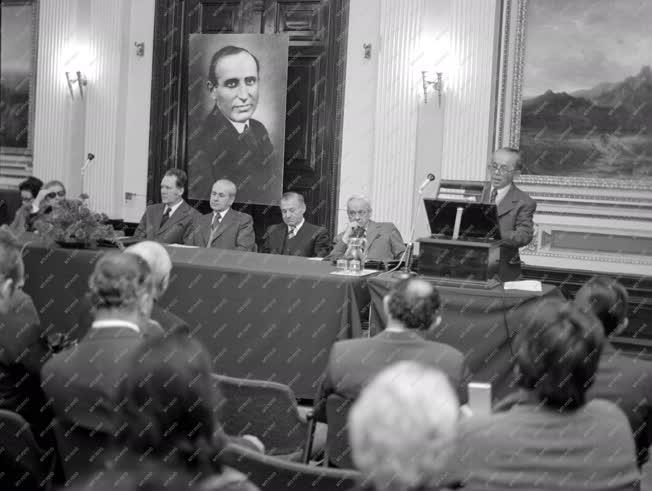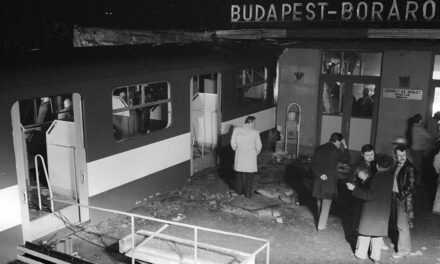The historian Zsuzsanna Borvendég's series was originally published on the PestiSrácok website, but there are certainly those who missed it. But those who haven't read all the parts should also read it again. Knowing the whole picture, can we understand how we got here?
The end of the Second World War did not bring the awaited liberation: the suffocating embrace of one murderous idea was replaced by another. On March 19, 1944, Hungary lost its sovereignty with the German occupation, and then the appearance of Soviet troops preserved a forced course for decades, which was radically contrary to Hungarian historical and cultural traditions. Three fundamental pillars of our socio-political system were immediately attacked: freedom, private property and faith.
In addition to making national self-determination impossible, the loss of freedom also meant the end of individual autonomy. While local organs of the Red Army exerted strong pressure on the selection of the members of the Provisional National Assembly - and personnel issues of the Provisional Government were decided directly in Moscow - millions of Hungarians suffered the most complete humiliation throughout the country.
The advance of the enemy army brought pain, suffering and slavery: few experienced the end of the war and the arrival of the new spring as cloudless liberation. The humiliation of girls and women, the abduction of hundreds of thousands of innocent civilians was only the beginning. The Soviets diverted attention from the clear steps of the communist takeover with the false promise of the possibility of democratic development.
They also took our souls
The Stalinist-type total state was built in a few years, bringing with it all its terrifying consequences. But the occupiers were not satisfied with the fatal transformation of the structure of society and the economy, by tailoring it to their own image, they wanted more than that: they also wanted to deprive us of our souls.
Sándor Márai had no illusions, he could not be infected by the feigned "humanism" of the Bolshevik ideology, yet he was unexpectedly struck by the totality of totalitarianism:
Of course he will take the pig, the wheat, the oil; the coal and the machines, there was no doubt about that. (At the time, I didn't suspect that he was also carrying people.) But what else does he want, besides pork, wheat and oil? Does he want my soul, and therefore my personality? Not much time passed and this question rang out with great force, not only in me, in the night and in the lonely village house. We learned that he wants to take all of this away, and on top of that, he wants our soul and personality. When we found out, this meeting took on a different meaning for the whole world beyond the fate of a nation, he wrote in his memoirs. Poignantly accurate vision.
To take God away from people
Bolshevism is the first total system of ideas in history, which lacked the exclusive political power and the complete appropriation of economic goods: it wanted to put both the spirit and the souls at its service. You have already read about the techniques of infecting the mind, but even more brutal destruction was done in human souls. This is no accident.
Nikolai Bergyaev devoted a separate chapter to the relationship between Bolshevism and Christianity in his work The Meaning and Origin of Russian Communism, in which he doubted that the ideology brought to power by the Lenins was simply a political-economic system. The Soviet-type dictatorship was totalitarianism itself, which broke into a monopoly, that is, wanted to bring the totality of life under its power. The most basic and important element of this is the person himself, whose most personal and intimate relationships determine his personality, thoughts, and actions. And with whom does one have the most personal relationship? With God, of course.
This bond can be deeper and more intimate than even the closest family community, and it is also uncontrollable and difficult to influence for an outside observer. In other words, it is impermissible for the total state.
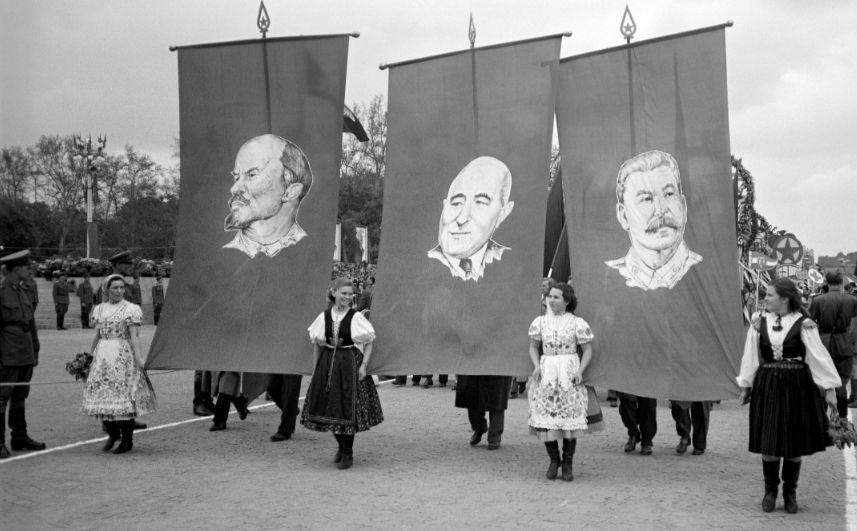
Gods instead of God: Lenin, Rákosi and Stalin (archive image: MTI/Ernő Vadas)
Saying no to love and compassion
The essence of Bolshevism can be captured in the fact that it did not see itself as an intellectual theory, but behaved as a religion, since only a religion can be so intolerant and fanatical. And from this, the elimination of all "rivals", that is, the persecution of churches and religions, followed as evidence.
The communists like to say that they are against the Christian evangelical morality, the morality of love and mercy and compassion. And perhaps this is the most terrible feature of communism, writes Bergyaev.
Christian morality was a greater enemy to them than the bourgeoisie. Lenin went so far as to consider the Christian communist more dangerous than the atheist citizen, a representative of the social class that was otherwise considered decadent, harmful and to be destroyed. Why? Because of the individual autonomy that came from the Christian faith.
The real enemies were not the capital, but the believers
Those who look towards eternity cannot be deterred from respecting eternal values, following divine commandments and the resulting responsibility of free will. Therefore, we should not be surprised that the biggest enemies of the Bolsheviks were not the big capitalists, who mostly themselves were far from the teachings of Christ, but the "priests without a reverend" (as Lenin referred to believers) who refused to submit to materialism. Communism broke into the place of religion, it wanted to take the place of Christ in the human soul. For his followers, he brought heaven down to earth and hid it in the benevolent distance of time with sonorous words: if you work with all your efforts and make superhuman sacrifices for the construction of the new world, your grandson can already grow up in the earthly Canaan, said the illusion.
The virus that broke loose in 1917 did not wreak the greatest havoc in human lives - despite the hundred million deaths - but in souls, the consequences of which are still unforeseeable today. Even Koestler, who claims to be an atheist, writes about this: ... it is possible that if a person excludes God from the system, something changes in his metabolism, and that the bacillus only grows more. If this be so, the disease, having originated some time in the eighteenth century, or even earlier, is now becoming most destructive, and, if allowed to spread according to its nature, will become a more terrible contagion than the small-pox once was...
The most extreme concentration of capital
In addition to freedom and faith - which are difficult to separate from either Christian free will or freedom of conscience and religion - the third fundamental value that came under indefensible attack was private property.
Communism, based on Marxist foundations, was theoretically born as a critique of capitalism, but in reality it implemented the most extreme concentration of capital ever seen in history. They called nationalization the process during which almost the entire wealth of a nation was made available to a narrow party elite without any kind of control being built into the system.
Even the regulatory mechanisms that were natural in the West, which they called exploitative, did not work: the market, or even trade union movements. Communism can actually be considered the most extreme manifestation of capitalism.
It was already built before the occupation
The first stage of the communist occupation of economic life in Hungary was the complete control of foreign trade: some Muscovites came back to our country in the fall of 1944 specifically with the task of establishing supervision over the exchange of goods before the nationalizations were carried out. They received their preliminary training in the international labor movement, were brought up in the ranks of the Comintern and the Soviet secret services, and several of them took a role in the construction of the secret financing of Western left-wing networks.
After the fall of the Soviet Republic, many Communards and People's Commissars found refuge in large Western cities - primarily Vienna and Berlin - where they joined the work of underground networks.
Jenő Varga and the "idea" of the Gulag
...The Leninists consciously used foreign trade to cover various secret actions, since the circulation of goods is a living system of economic relations in which money flows constantly. Excellent terrain for secret service operations and the flow of illegal money, it was therefore the only area that Lenin did not allow for a moment in the hands of the magnates who bought concessions.
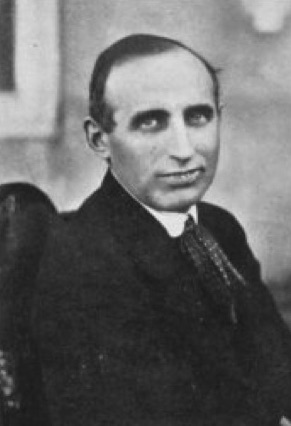
Jenő Varga is the apostle of forced labor (archive image: Wikipedia)
The trade network was quickly established, and the Soviet trade office in Berlin, employing nearly eight hundred people, hosted the financial center of the Comintern, in the creation of which Jenő Varga, the former people's commissar for finance, played a prominent role. Jenő Varga's name is definitely worth noting, since it was his idea to put prisoners of war into forced labor, that is, to treat them as war reparations and to exploit the human workforce in the most miserable conditions - the direct consequence of this idea was the deportation of hundreds of thousands of civilians to the Gulag and Gupvi camps in 1944/45.
His student, László Háy, also fled to the West in 1919, then learned all the little secrets of financing communist networks with Varga. Zoltán Vas became involved in the work of the Comintern , who, Mátyas Rákosi , was exchanged by the Hungarian government for the 1848 war flags in the spring of 1941.
Source: PestiSrácok
Author: historian Zsuzsanna Borvendég
(cover photo: Jenő Varga memorial meeting at the Academy, in 1979.
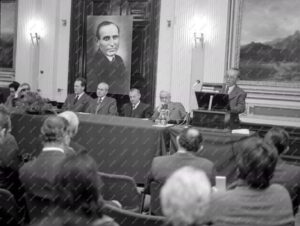
Image: MTVA Archive
)

